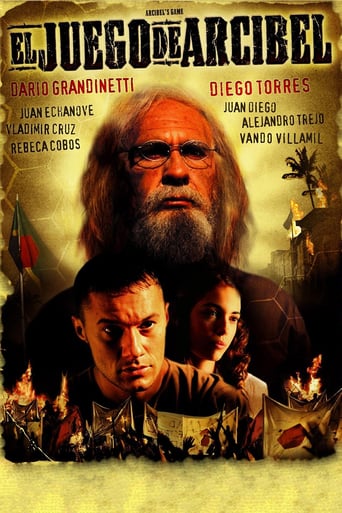Emil Bakkum
The story in this film leaves lots of room to speculate about its message. It plays in a fictitious Latin-American republic, ruled by a dictator. The main character Arcibel is employee at a newspaper, where he is responsible for the chess articles and the crossword puzzles. He is divorced, and has a young daughter. One day he has an accidental meeting with two street girls. On the same day he is arrested, and the police magistrate accuses him a of hiding a subversive message in his newest chess article. This makes him a political dissident, and he is locked up in prison for an indefinite time. The repressive state system realizes that he is innocent, and that the accusation was made solely in order to justify the existence of the security service. However, the system boasts its infallibility, and therefore Arcibel must remain in prison and forgotten for the rest of his life. There he meets lots of real political dissidents, and these awaken his political consciousness. The news of of Che Guevaras' death brings great sadness to the inmates (just to sketch their political orientation and atmosphere). Arcibel has recurring hallucinations about one of the street girls. After some twenty years his daughter discovers his existence, due to the fact that she has been given his job at the newspaper. She visits him for the first time. In the mean time Arcibel has lost all desire to leave his prison environment, but she keeps visiting him on a regular basis and hides messages in her articles. Then a young inmate is housed in the same cell as Arcibel. Arcibel educates him, and teaches him a strategy in order to beat the dictator and win the revolution. After some years the young man is released, and behold, he starts and wins the revolution. Arcibel has become the martyr and is praised as the ideological theorist of the uprising. He is freed and the young man marries his daughter. Basically the story is credible. Perhaps in Latin America this film is valued because it contains many incidents, that are recognizable. In Latin America, the use of violence remains a part of the political spectrum, and the social injustice is still smarting and bitter. The memory of Che lingers on, and in some republics a revolution might be part of a democratic solution. But being a European, I find it difficult to relate to the story, and to sympathize with the main characters. The role of the street girls remains a mystery for me (in itself fantasizing in a prison cell is normal). Is this a film about revolution? About the political corruption? About imprisonment? About a goalless life? Perhaps I have missed some hidden deeper layers in the film.
zareliman
El Juego de Arcibel clearly resembles the situation in many Latin American countries with a delicate metaphor. The story is quite smart, because resembles the stupidity of military power in the civil-war caused by the growing economical crisis, created by the interests of a bad management of the executive power. Another plus point I considered, was the ability to create a new country, the actors chosen for that (some of them are Premium really), among all the countries, gave the movie an incredible virtual sub-language of Spanish, merging the talking styles of Chile, Argentina, Spain, etc... The photography is clearly very professional, good scenery, some time swaps/dreams with non-expensive effects create a very nice atmosphere. The dialogs chosen are very complex, nice words, good use of Spanish language (something I appreciate very much cause that's my native language). Some people would say this movie is rather slow or boring, but's not a mainstream movie, even though it's OK and worth watching in my opinion if you want to have some fun, the movie itself is not boring and not very complex on the first read, the story is quite interesting and catching. Definetively worth watching...
jotix100
Miranda, a fictitious country in Latin America, serves as the background for this story in which Arcibel Alegria's life comes to a complete stop for a crime he didn't commit. Arcibel, a newspaper employee's chess column is deemed subversive by the right wing dictator. Arcibel, who has absolutely no saying in the matter, begins a long jail term because he happened to be in the wrong place, at the wrong time.Life in jail is miserable. Being in the cell next to Palacios, proves to be a blessing. Palacios loves to play chess and has even made a miniature version that serves him well. The two men communicate by knocking on the wall the movements they want to play in the game. When a young inmate, Pablo, arrives at the prison, Arcibel conceives a game to teach this almost illiterate young man, a game that will serve as the basis of a revolution in the country and also his personal revenge for having been unjustly punished.Alberto Lecchi, an Argentine director, co-wrote the screen play with Diego Garcia Molt. Mr. Lecchi creates an oppressive film from whom Arcibel can't escape. In fact, there is nothing this man can do, as everybody seem to be against him. The creators of the film try to show how a man's dignity is stripped away by egotistical and petty people who feel threatened by people like Arcibel, who never conspired to do such thing.Dario Grandinetti, wearing a wig, is seen as Arcibel, a somber character. The actor plays him with that solemnity he seems to be asked by his directors after his work in "Talk to Her". Mr. Grandinetti has done much better work before, and it shows that when he works with a director who can guide him better, the result translates into excellent acting. We get mixed feelings for Mr. Grandinetti's work in this film. Juan Diego, Diego Torres, Juan Echanove, Vladimir Cruz, and the rest of the cast project the right atmosphere about life in jail.



